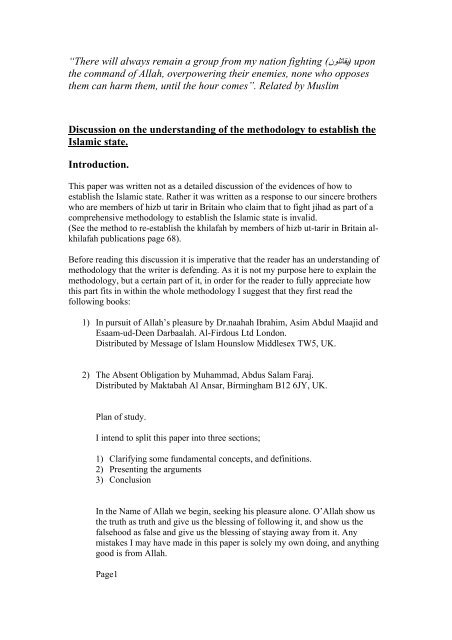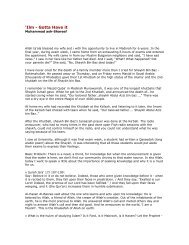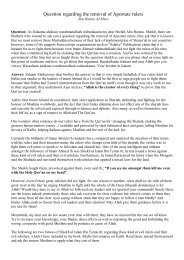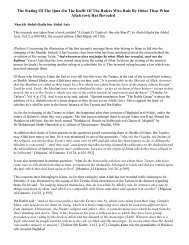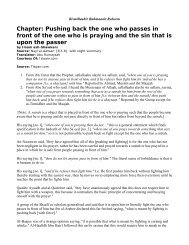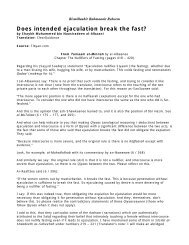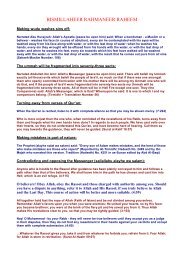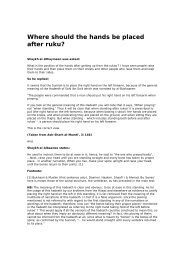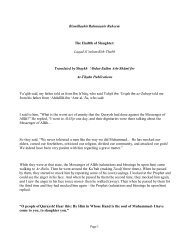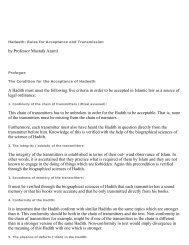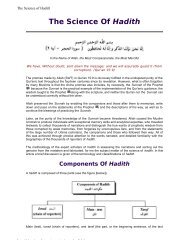Methodology - Hoor al-Ayn
Methodology - Hoor al-Ayn
Methodology - Hoor al-Ayn
Create successful ePaper yourself
Turn your PDF publications into a flip-book with our unique Google optimized e-Paper software.
“There will <strong>al</strong>ways remain a group from my nation fighting (نﻮﻠﺗﺎﻘﻳ) upon<br />
the command of Allah, overpowering their enemies, none who opposes<br />
them can harm them, until the hour comes”. Related by Muslim<br />
Discussion on the understanding of the methodology to establish the<br />
Islamic state.<br />
Introduction.<br />
This paper was written not as a detailed discussion of the evidences of how to<br />
establish the Islamic state. Rather it was written as a response to our sincere brothers<br />
who are members of hizb ut tarir in Britain who claim that to fight jihad as part of a<br />
comprehensive methodology to establish the Islamic state is inv<strong>al</strong>id.<br />
(See the method to re-establish the khilafah by members of hizb ut-tarir in Britain <strong>al</strong>khilafah<br />
publications page 68).<br />
Before reading this discussion it is imperative that the reader has an understanding of<br />
methodology that the writer is defending. As it is not my purpose here to explain the<br />
methodology, but a certain part of it, in order for the reader to fully appreciate how<br />
this part fits in within the whole methodology I suggest that they first read the<br />
following books:<br />
1) In pursuit of Allah’s pleasure by Dr.naahah Ibrahim, Asim Abdul Maajid and<br />
Esaam-ud-Deen Darba<strong>al</strong>ah. Al-Firdous Ltd London.<br />
Distributed by Message of Islam Hounslow Middlesex TW5, UK.<br />
2) The Absent Obligation by Muhammad, Abdus S<strong>al</strong>am Faraj.<br />
Distributed by Maktabah Al Ansar, Birmingham B12 6JY, UK.<br />
Plan of study.<br />
I intend to split this paper into three sections;<br />
1) Clarifying some fundament<strong>al</strong> concepts, and definitions.<br />
2) Presenting the arguments<br />
3) Conclusion<br />
In the Name of Allah we begin, seeking his pleasure <strong>al</strong>one. O’Allah show us<br />
the truth as truth and give us the blessing of following it, and show us the<br />
f<strong>al</strong>sehood as f<strong>al</strong>se and give us the blessing of staying away from it. Any<br />
mistakes I may have made in this paper is solely my own doing, and anything<br />
good is from Allah.<br />
Page1
Page2<br />
PART 1: CLARAFYING SOME FUNDEMENTAL CONCEPTS AND<br />
DEFINITIONS.<br />
I will list these as a series of points.<br />
1) We are Muslims, and as Muslims we are require to do certain actions, and<br />
stay away from others.<br />
The prophet Muhammad is reported to have said:<br />
“What I have forbidden to you, avoid; what I have ordered you (to do), do<br />
as much of it as you can.” Related by Al-Bukhari and Muslim.<br />
2) We have been ordered to establish the Islamic State. This is proven by<br />
various evidences (see page 65 In Pursuit of Allah’s Pleasure <strong>al</strong>so page 19<br />
The Absent Obligation and Al-Ahkam as-Sultaniyyah page 10 Ta-Ha<br />
publishers Ltd.)<br />
3) This obligation is known to be fard a keyfayah, and thus if neglected, those<br />
capable of carry out the work required to achieve the obligation, become<br />
sinful. ناﺪﻳز ﻢﻳﺮﻜﻟا ﺪﺒﻋ رﻮﺘآﺪﻠﻟ ﻪﻘﻔﻟا لﻮﺻﻷا ﻲﻓ ﺰﻴﺟﻮﻟا ﺮﻈﻧا<br />
4) So what is the definition of the khilafah, and does it exist today?<br />
a) Definition of the Islamic state (<strong>al</strong>so known as the khilafah, darl-aislam,<br />
or imamate).<br />
There are many definition’s given by the scholars of Islam for the<br />
Islamic state, <strong>al</strong>l of which may be summed up in the definition:<br />
The Islamic State according to Islamic scholars is every<br />
country/region in which the Muslims rule and the Islamic shariah<br />
is implemented.<br />
( 50 ص ناﺪﻳز ﻢﻳﺮﻜﻟا ﺪﺒﻋ رﻮﺘآﺪﻟا ﻒﻴﻟﺄﺗ ﺔﻴﻬﻘﻓ ثﻮﺤﺑ ﺔﻋﻮﻤﺠﻣ<br />
ﺮﻈﻧا )<br />
From this definition we may take that the Islamic state is a state in<br />
which:<br />
1) The authority is in the hands of the Muslims, meaning they have<br />
the ability to implement the laws they decide to govern by, and<br />
defend it.<br />
2) The sovereignty belongs to Allah, meaning that the source of <strong>al</strong>l<br />
legislation must be the shariah of Muhammad (may the peace and<br />
blessings of Allah be upon him).
) Does the Islamic state exist today (5-4-2002)?<br />
By looking at the re<strong>al</strong>ity of the Muslim countries we can see that there<br />
is not one Muslim country which use’s the Islamic Shariah as it’s sole<br />
basis for legislation even though those in authority claim to be<br />
Muslims.<br />
Please look at the fatwa of ibn taymiya (may Allah have mercy on<br />
him) against the tartar’s to see how we are supposed to judge this<br />
re<strong>al</strong>ity.<br />
.( 509ص<br />
28ج<br />
مﻼﺳﻹا ﻰﻟإ ﻦﻴﺒﺴﺘﺒﻤﻟا ﺮﺗﺎﺘﻟا ﻢﻜﺣ ﻦﻋ لاﺆﺳ : ىوﺎﺘﻔﻟا ﺔﻋﻮﻤﺠﻣ)<br />
C) Defining our re<strong>al</strong>ity.<br />
Based on what has previous been stated our re<strong>al</strong>ity may be defined<br />
as follows;<br />
The absence of the Islamic State, which in turn means;<br />
In Muslim countries the Muslims do not have authority, and/or the<br />
sovereignty is not for Allah.<br />
It must be one or the other or both according to what been stated.<br />
Those in authority claim to be muslims, thus the foc<strong>al</strong> issue is that<br />
their reference point in <strong>al</strong>l matters must be Islam (i.e sovereignty<br />
must be for Allah <strong>al</strong>one).<br />
The essence than in trying to establish the Islamic state in<br />
Muslim countries is an issue of making Allah’s Word<br />
sovereign.<br />
5) Now that we are aware of the obligation of the Islamic state, and its<br />
Implications (see 3) and its non-existence at this point in time what are we<br />
required doing about it?<br />
We are ordered to refer <strong>al</strong>l matters back to Islamic Shariah. (See surah 4 verse<br />
44,50,59).<br />
6) Commands in the Islamic shariah are either decisive or non decisive in<br />
respect to its transmission and/or implication.<br />
Non-decisive texts are the basis of ijtihad.<br />
Now scanning the text of the quran, Sunna and ijma we don’t find any definite<br />
evidence on the way to establish the Islamic state after its abolishment in<br />
1924.<br />
Thus we are lead into the field of ijtihad .<br />
Page3
5) Before discussing ijtihad I would like to state a few important points.<br />
At the time of the Prophet Muhammad (peace and blessings of Allah be upon<br />
him), verses of the Quran were reve<strong>al</strong>ed addressing certain matters.<br />
Now those verses, and the sunna of the prophet (pbuh) are limited in number<br />
but are unlimited in application as they serve as a basis for <strong>al</strong>l laws of man<br />
until the Day of Judgment.<br />
There are many principles used by scholars of usool, one important one I want<br />
illustrate is that which is c<strong>al</strong>led the effective cause(or more simply, the reason<br />
of the legislation) of a law ( طﺎﻨﻣ وأ ﺔﻠﻋ ) and the difference between it and the<br />
re<strong>al</strong>ity ( ﻊﻗاﻮﻟا ) .<br />
The re<strong>al</strong>ity is what is perceived by the senses and interpreted by the sound<br />
mind.<br />
The effective cause is the constant apparent attribute upon which the particular<br />
law is based.<br />
It is this effective cause, which is important to decipher in order to uncover the<br />
v<strong>al</strong>ue of law (i.e it’s hukum, e.g. fard or haram) of a similar matter, which<br />
shares the same effective cause.<br />
The effective cause is either apparent from the Islamic sources by clear<br />
indication, or it is <strong>al</strong>luded to (this is done from the usage of certain words<br />
which indicate the reason for an action either definitely or indefinitely), or no<br />
indication might be forth coming from that particular text and thus other texts<br />
must be an<strong>al</strong>yzed in order to deduce the effective cause.<br />
But this is not left to the whims of scholars, but there are many conditions,<br />
which need to be fulfilled.<br />
One of these conditions is that the cause must promote or defend the gener<strong>al</strong><br />
aim(s) of the shariah in a way understandable to the sound mind.<br />
These aims are<br />
1) the religion of islam<br />
2) Human life<br />
3) The mind<br />
4) Lineage / Honor<br />
5) We<strong>al</strong>th<br />
Page4
Example:<br />
The saying of the prophet (peace be upon him)” every wine is an intoxicant,<br />
and very intoxicant is unlawful”. Gives the clear reason for the forbidding of<br />
wine and is extended to <strong>al</strong>l other intoxicating substances.<br />
Now solid drugs like cocaine are very much different from wine in it’s<br />
appearance, taste etc. i.e. the re<strong>al</strong>ity of it is different but because the effective<br />
cause is the same (the intoxication of the mind) the v<strong>al</strong>ue of the law is the<br />
same. (i.e. it is forbidden).<br />
Side note: qiyas owla is when the effective cause is more evident in the branch<br />
case ( i.e the new matter) then in the origin<strong>al</strong> case (i.e. the Quranic text or the<br />
hadith).<br />
The important point to understand is that the hukm of a particular matter<br />
deduced by qiyas is dependent on the identification of the effective cause and<br />
this is linked to the gener<strong>al</strong> aims of the shariah.<br />
7) Ijtihad is the process of extracting practic<strong>al</strong> laws of shariah from its detailed<br />
evidences.<br />
This happens when there are no definite texts available for a particular matter.<br />
Ijtihad is v<strong>al</strong>id if there is no definite text on a practic<strong>al</strong> issue and none of the<br />
laws of ijtihad are broken.<br />
These laws are many, a few examples are;<br />
The mujtahid considers <strong>al</strong>l texts that he deems relevant to the issue.<br />
He is aware of cases of abrogation of the law of certain texts.<br />
If he considers a law to be abrogated but continues to use the law his ijtihad<br />
will be inv<strong>al</strong>id. In the same way if he knows of sound relevant texts but<br />
neglects to consider them his ijtihad will <strong>al</strong>so be inv<strong>al</strong>id.<br />
8) It is important to recognize that we are ordered to follow the shariah of the<br />
prophet(pbuh) and not necessarily the prophet himself (peace be upon him)<br />
This is because not <strong>al</strong>l his actions were meant to be followed like his<br />
marriage to more than 4 wives, or those that have been abrogated(e.g<br />
mutta, temporay marriage).<br />
9) Following the strongest evidence.<br />
Muslims are obliged to follow what they think the shariah has ordained for<br />
them to do, and this means following what we are most convinced of.<br />
We are <strong>al</strong>so encouraged to seek further knowledge to consolidate our<br />
understanding.<br />
But it is important to re<strong>al</strong>ize that that the scholar’s have permitted<br />
following a scholar on a matter of ijtihad without knowing his detailed<br />
evidences.<br />
The truth of the matter is that unless we reach the level of ijtihad our<br />
selves we are bound to follow another person’s ijtihad.<br />
If there is a choice between two ijtihads we should follow the one we are<br />
most convinced of.<br />
Page5
Page6<br />
10) WHAT IS THE MEANING OF JIHAD?<br />
ﻞﻜﻴه ﺮﻴﺧ ﺪﻤﺤﻣ رﻮﺘآﺪﻠﻟ لﺎﺘﻘﻟا و دﺎﻬﺠﻟا ﺮﻈﻧا<br />
According to the scholars of usool the liter<strong>al</strong> usage of a word can be<br />
split into 4 groups.<br />
a) The liter<strong>al</strong> linguistic meaning:<br />
That is a word used in its origin<strong>al</strong> linguistic context e.g. a horse<br />
b) The liter<strong>al</strong> shariah meaning:<br />
This is a word placed by the Lawgiver (Allah(swt)), as a meaning<br />
not placed by the Arabs before.<br />
e.g. ةﻼﺼﻟا (prayer)<br />
The Arabs used the word to mean ءﺎﻋﺪﻟا, the shariah transferred this<br />
meaning to a new one, that being; the actions and the saying<br />
opened with the takbir, and finished with the tasleem.<br />
c) The liter<strong>al</strong> gener<strong>al</strong> customary meaning. مﺎﻌﻟا ﺔﻴﻓﺮﻌﻟا ﺔﻘﻴﻘﺤﻟا<br />
This is a word transferred from its linguistic meaning to a meaning<br />
acknowledged by the people at large.<br />
e.g. The word ﺔﺑاﺪﻟا , origin<strong>al</strong>ly its linguistic meaning was any thing<br />
that w<strong>al</strong>ked on the earth, but then it commonly became to be used<br />
as representing any 4 legged creature.<br />
d) The liter<strong>al</strong> specific customary meaning صﺎﺨﻟا فﺮﻌﻟا ﺔﻘﻴﻘﺤﻟا<br />
This is a word transferred from its linguistic meaning to a new<br />
meaning acknowledged by a specific community of people.<br />
e.g. ﺮﺠﻟا ﺐﺼﻨﻟا ﻊﻓﺮﻟا the nomin<strong>al</strong> , the subjunctive and the genitive<br />
as known to the grammarians.
A) THE LINGUISTIC MEANING OF JIHAD.<br />
.<br />
The word Jihad (دﺎﻬﺟ) in Arabic, is a verb<strong>al</strong> noun. It comes from the quadrilater<strong>al</strong><br />
verb (ﺪهﺎﺟ ).This form implies the participation of 2 sides.<br />
In Lisaan Al-Arab it states: Jihad is the utmost excursion of energy and ability in<br />
actions and speech.<br />
In Tafseer Al-Neesaaboori it states: Jihad is the excursion of effort to attain a go<strong>al</strong>.<br />
In the explanation of Tafeer J<strong>al</strong><strong>al</strong>ain, it states: Jihad is patience upon difficulty,<br />
and this could be in war or within oneself.<br />
The summary is that Jihad is the upper most excursion in order to attain a go<strong>al</strong> in<br />
the presence of opposition (even if this opposition is struggling against oneself).<br />
B) THE SHARIAH MEANING OF JIHAD.<br />
According to the Hanifees it is mentioned in there book Bidaai’ Al-Sinaai’, by Al-<br />
Kaasaanee ( 97 -7<br />
ﻲﺋﺎﺴﻜﻠﻟ ﻊﺋﺎﻨﺼﻟا ﻲﺋاﺪﺑ):<br />
Jihad according to the shariah is the using of <strong>al</strong>l ones ability in fighting in the way<br />
of Allah whether with ones we<strong>al</strong>th or tongue or other than that.<br />
According to the M<strong>al</strong>ikees it is mentioned in Minhu Al-J<strong>al</strong>eel<br />
( 135 -3<br />
ﺶﻴﻠﻋ ﺪﻤﺤﻣ ﺦﻴﺸﻠﻟ ﻞﻴﻠﺧ يﺪﻴﺳ ﺮﺼﺘﺨﻣ<br />
ﻞﻴﻠﺠﻟا ﺢﻨﻣ):<br />
Jihad is fighting between muslims and non-muslims, that are not under a treaty<br />
with the muslims, for the purpose of making Allah’s Word the supreme, or the<br />
coming for the fighting or entering the kafirs land for fighting.<br />
According to the Shafees it is mentioned in Al-Iqnaa’ ( عﺎﻨﻗﻹا ):<br />
( 225 -4<br />
ﺐﻴﻄﺨﻟا حﺮﺷ ﻰﻠﻋ ﻲﻣﺮﻴﺠﺒﻟا ﺔﻴﺷﺎﺣ)<br />
Jihad is fighting in Allah’s way (cause).<br />
According to the Hanb<strong>al</strong>ees the same meaning as the Shafees is given and this<br />
can be seen in Al- Mugnee by Ibn Qudama chapter The Book Of Jihad<br />
( 375 -10<br />
ﺔﻣاﺪﻗ ﻦﺑﻻ ﻲﻨﻐﻤﻟا).<br />
This can be seen by the context of the usage of the word<br />
jihad in this chapter.<br />
The summary of Jihad according its shariah can be taken from the definition given<br />
in the Haasheah of Ibn Abideen ( 332 -3<br />
ﻦﻳﺪﺑﺎﻋ ﻦﺑا ﺔﻴﺷﺎﺣ):<br />
Jihad is the upper most excursion in fighting in Allah’s cause, directly, or helping<br />
with we<strong>al</strong>th or by opinion.<br />
Page7
Please note that the Quranic verses reve<strong>al</strong>ed in Mecca using the word Jihad or one<br />
of its derivatives is primarily referring to the linguistic meaning. Whereas those<br />
verse reve<strong>al</strong>ed after the Hijrah refer to what has been stated above.<br />
C) THE GENERAL CUSTOMARY MEANING<br />
The meaning of Jihad was transferred by the shariah from its linguistic meaning to<br />
the shariah meaning until the shariah meaning dominated the gener<strong>al</strong> public usage<br />
of the term.<br />
D) THE SPECIFIC CUSTOMARY MEANING<br />
By looking at the Islamic Books written by scholars of different fields, we can see<br />
that they didn’t create a specific usage for the word Jihad. Rather they used it<br />
according to its Sharaih and gener<strong>al</strong> customary meaning, which is fighting in the<br />
cause of Allah.<br />
Fin<strong>al</strong>ly we see that there are only 2 usages of the word Jihad.<br />
The first is its linguistic meaning, and the second is its shariah meaning.<br />
Throughout the rest of this discussion I will be using the word Jihad in its shariah<br />
meaning as summarized above. (i.e. fighting to make Allah’s word supreme).<br />
When this word appears by itself it means physic<strong>al</strong> fighting, but when it is<br />
qu<strong>al</strong>ified it goes to its intended meaning (i.e. jihad of the tongue etc).<br />
Page8
PART 2 PRESENTING THE ARGUMENTS FOR THE OBLIGATION<br />
OF FIGHTING ANY RULER WHO DOES NOT RULE ACCORDING<br />
TO THE SHARIAH, AND JIHAD AS BEING AN INTEGRAL PART<br />
OF WORKING TO ESTABLISH THE ISLAMIC STATE.<br />
I intend to present my argument as follows:<br />
A) The abrogation of the Prophets (pbuh) prohibition of fighting in Mecca and<br />
its replacement by the order to fight. Thus if we find ourselves in a similar<br />
situation as the prophet was in Mecca (i.e. without the Islamic State), we<br />
would be obliged to fight in order to make the sovereignty for Allah <strong>al</strong>one. So<br />
there is no basis for saying jihad cannot be used to establish the Islamic state.<br />
The details of the abrogation can be seen in appendix1.<br />
B) That the fin<strong>al</strong> rulings, regarding fighting, was reve<strong>al</strong>ed in order to make<br />
the sovereignty completely for Allah . Making the sovereignty for Allah<br />
<strong>al</strong>one is the essence of establishing the Islamic State in Muslim countries. (see<br />
part1 4c). Thus we are obliged to fight jihad in order to establish the Islamic<br />
State. Please see appendix 2<br />
C) The obligation to fight any ruler who does not rule according to the Islam.<br />
Our present rulers are not ruling according to Islam, thus we are ordered to<br />
fight them until the sovereignty is completely for Allah.<br />
Thus looking at points A, B and C we can see that fighting jihad is an integr<strong>al</strong><br />
part of the correct methodology to establish the Islamic State.<br />
Page 9
PART A<br />
1) It is reported in seerah of Ibn Hisham that some of the companions of the<br />
prophet (pbuh) asked permission to fight Quresh, and the prophet replied<br />
that he had not been ordered to do that yet.<br />
Note that the prophet (peace be upon him) was getting revelation and <strong>al</strong>l the<br />
ayats reve<strong>al</strong>ed in Mecca about this issue c<strong>al</strong>led for patience. So his actions<br />
were in accordance with the verses.<br />
This incident is often used by those claming that it is forbidden to fight for the<br />
establishment of the Islamic state.<br />
2) The second pledge of Al-Aqabah is known as the pledge of war.<br />
This occurred in mekka before any verses of jihad were reve<strong>al</strong>ed.<br />
Ibn Hisham narrates that the prophet (peace be upon him ) said<br />
“I will wage war against whom you wage war against and declare peace with<br />
whom you declare peace, my blood is your blood and my pact is your pact.”<br />
When the prophet (peace be upon him) emigrated to Madinah the people of<br />
Aws and Khazraj came out in war clothing, in order to prevent any opposition<br />
that might arise.<br />
Thus combing the two incidents would lead one to believe that fighting<br />
was only permissible after you have secured support from ahlul nusrah<br />
( the people of power/authority).<br />
But let us look further!<br />
Page10
3) After the migration to medina the ayats of jihad were reve<strong>al</strong>ed.<br />
Indeed most of the scholars of tafseer-ul-quraan spoke about a verse of the<br />
quraan and c<strong>al</strong>led it ayat as-saif (the verse of the sword) and that is the saying<br />
of Allah(swt)<br />
“Then when the sacred months have passed, then kill the mushrikun wherever<br />
you find them, and capture them and besiege them and prepare for them each<br />
and every ambush”<br />
Concerning this verse Ibn katheer said “ad-dahkak ibn muzahim said: Verily it<br />
abrogated every treaty, contract and term between the prophet ( peace be upon<br />
him and the mushrikun.”<br />
Al-Awfi reported Ibn abbas (may Allah be please with him) said about this<br />
verse: no treaty or covenant was left for any one from the mushrikun after<br />
surah baraa(at-Tawba) was reve<strong>al</strong>ed.<br />
Al-Haafith Al-Q<strong>al</strong>bi said: And we find here what abrogated the turning away<br />
from the disbelievers and keeping patient about the harm they do to us. This is<br />
to order us to fight them and to avail us from repeating that which was<br />
abrogated, which was mentioned in 114 verses out of 54 surahs.<br />
This means that the reply given by the prophet (pbuh)(see point 1) was<br />
abrogated as the verses which were governing his actions at that time were<br />
abrogated.<br />
(Side note Imam Suyuti opinion about the abrogated verses actu<strong>al</strong>ly being in a<br />
category of what “Allah (swt) has caused to be forgotten”, thus when Muslims<br />
are weak and few in number they must remain patient, is weak and goes<br />
against clear hadith;<br />
“jihad will continue until the day of judgment” Abu dawood<br />
“There will <strong>al</strong>ways remain a group from my nation fighting(نﻮﻠﺗﺎﻘﻳ ) upon the<br />
command of Allah overpowering their enemies, none who apposes them can<br />
harm them until the hour comes”. Related by Muslim. )<br />
Page11
Now let us consider the words of the scholars. If the kufaar gain power<br />
over us as they had over the prophet in Mecca, they obviously would not<br />
be ruling according to Islam, should we remain patient or are we obliged to<br />
fight them? According to the strongest position we would have to fight<br />
them because the verse ordering to fight the mushrikun has abrogated the<br />
statement in point 1.<br />
This is the case when a kafir nation invades the Muslim lands and subdues<br />
its people as is happening in Chechnya at the present time.<br />
Now does this now <strong>al</strong>low use to fight to establish the Islamic state?<br />
In order to answer this question we must look more deeply into the<br />
reason for the legislation of fighting in Islam.<br />
PART B) Why is fighting <strong>al</strong>lowed in Islam?<br />
Allah says: AND FIGHT THEM UNTIL THERE IS NO MORE FITNAH<br />
AND THE RELIGON IS WHOLLY FOR ALLAH 8/39<br />
Ibn Taymiyyah said: so if part of the religion is for Allah and another is for<br />
other than him, fighting is obligatory until the religion is for Allah <strong>al</strong>one.<br />
He wrote this in a fatwa regarding the tartar’s that used to govern by other<br />
than islam.( <strong>al</strong>-fataawa 28/354)<br />
Al-Bukhari and Muslim narrated on the authority of Abu Musa (may Allah<br />
be pleased with him) that the messenger of Allah (pease be upon him) was<br />
asked:<br />
WHICH JIHAD IS IN THE CAUSE OF ALLAH?<br />
HE REPLIED:<br />
HE WHO HAS FOUGHT TO RAISE THE WORD OF ALLAH<br />
SUPREME IS IN THE CAUSE OF ALLAH.<br />
So Jihad in Islam is to raise Allah’s word highest.<br />
i.e. The sole basis for the legislation of fighting in islam, is to make the<br />
shariah supreme.<br />
Jihad has been legislated to make the religion highest, which is the highest<br />
priority out of the gener<strong>al</strong> aims of the shariah (see part1 section7).<br />
No Muslim of sound faith denies that jihad is an on going obligation.<br />
But it is strange to see those people who admit the obligation of jihad to<br />
defend Muslim life and Muslim land but do not see it as a way to establish<br />
Allah’s religion (i.e. the Islamic state). Even though the effective cause of<br />
jihad is to make Allah’s word supreme i.e. sovereign, and this is more<br />
apparent in the latter case than in the former two.<br />
So from qiyas owla it would necessitate that jihad was obligatory in order to<br />
establish the state.<br />
Page12
PART C) Rebellion against the ruler.<br />
It was related in saheeh Muslim that Junadah ibn ‘Umayyah (may Allah be<br />
pleased with him) said:<br />
…The Messenger of Allah (peace be upon him) …said: WE SHOULD NOT<br />
CHALLENGE THOSE IN AUTHORITY OVER US UNLESS YOU SEE<br />
KUFUR BAWAAH AND YOU HAVE PROOF OF IT FROM ALLAH.<br />
Imam Nawawi (may Allah have mercy on him) said Al-Qadhi Iyyadh said:<br />
The scholars were agreed that the leadership must not be conferred to a<br />
disbeliever, and should the ruler reve<strong>al</strong> kufur he must be removed. Likewise<br />
If he abandons establishing prayers and c<strong>al</strong>ling for them……if he manifests<br />
kufur, a change of shariah or a bid’ah , he is out of leadership and obeying him<br />
becomes inv<strong>al</strong>id. It is the obligation of the Muslims to stand up to remove him<br />
and replace him with a just ruler, if they are able to do so.<br />
The members of HT in Britain write, in their book entitled The Method to<br />
establish The Islamic state, whilst commenting on this hadith page 68:<br />
“However these ahadith are not connected to the current situation. They are <strong>al</strong>l<br />
connected to revolt and rising against the kh<strong>al</strong>eefh and are titled under the<br />
subject of khurooj min <strong>al</strong> kh<strong>al</strong>eefh i.e. rising against the authority of a<br />
kh<strong>al</strong>eefh or an imam”<br />
Later on they say:<br />
“The ahadith of fighting apply to changing a ruler i.e. a kh<strong>al</strong>eefh who has gone<br />
astray not a system, ONLY THE STRUGGLE OF THE PROPHET (SAW)<br />
IN MAKKAH APPLIES TO CHANGING OF A SYSTEM. SO MILITARY<br />
STRUGGLE IS NOT THE METHOD TO RE ESTABLISH THE<br />
KHILAFAH.”<br />
From these statements we can see 2 things:<br />
1) That their objection for applying these ahadith today are based on the fact<br />
that<br />
a) The leader must have first been ruling by Islam then went astray i.e. he was<br />
a legitimate ruler but then turned bad (unlike our present rulers who have<br />
never ruled according to Islam)<br />
b) These ahadith relate to removing a person not a state.<br />
2) They consider the makkan period as being the only time the prophet<br />
changed a system.<br />
Page13
Reply to 1a.<br />
First lets read the words of Al-Haafidh Ibnu Katheer:<br />
In interpreting the verse:<br />
DO THEY THEN SEEK THE JUDGMENT OF (THE DAYS OF)<br />
IGNORANCE? 4/50<br />
He said: Allah(swt) rebukes those who leave Allah’s judgment, which<br />
contains <strong>al</strong>l that is good and just and forbids <strong>al</strong>l that is bad. They turn instead<br />
to the opinions, desires and laws laid down by men without any recourse to<br />
Allah’s Shariah. …And the TARTAR’S USED TO JUDGE ACCORDING<br />
TO THE LAWS LAID DOWN BY THEIR RULERS, TAKEN FROM<br />
THEIR KING GHENGHIS KHAN WHO PUT TOGETHER FOR THEM A<br />
LAW BOOK (YASA) EXTRACTED FROM DIFFERENT LAWS OF THE<br />
JEWS, CHRISTIANS AND THE RELIGION OF ISLAM AND OTHER<br />
SOURCES. It <strong>al</strong>so contained many laws and regulations taken solely from his<br />
own opinion and wishes which later became a system of law followed by the<br />
people and given precedence over the laws of Allah’s Book and the sunnah of<br />
his messenger (pbuh). Therefore WHOEVER DOES THAT IS A KAFIR<br />
WHO MUST BE FOUGHT UNTIL HE RETURNS TO THE LAW OF<br />
ALLAH AND HIS MESSANGER, AND DOES NOT GOVERN ON ANY<br />
MATTER EXCEPT BY THE LAW.<br />
Please note that the tartars never ruled according to Islam until they were<br />
beaten in the fin<strong>al</strong> battle of Shaqhab around 702AH.<br />
They were never considered as legitimate rulers who then latter deviated.<br />
Nor were they considered ahul bugah <strong>al</strong>-muta-awwileen i.e. misconceived<br />
rebels against the imam. Al-Fataawa 28/540-541<br />
Nor were they fought as kafir invaders.<br />
But they were fought because they didn’t implement the shariah.<br />
This can be clearly seen from the fatwa of ibn taymiyyah;<br />
Page14
The summary of his fatwa is as follows:<br />
EVERY GROUP, which rebels against the mutawaatir law of Islamic shariah,<br />
must be fought by the consensus of <strong>al</strong>l the imams of the Muslims. even if they<br />
pronounce the shahaadah .<br />
….the Tartars and THE LIKE have more greatly rebelled against the Islamic<br />
shariah than those who refused to pay zakat….thus he who doubts about<br />
fighting them is the most ignorant of the people about the religion of islam…<br />
This is because the reason (effective cause) for fighting is to make the<br />
shariah supreme.<br />
It is clear from the above that the condition 1a is not a v<strong>al</strong>id<br />
consideration.<br />
As for 1b anyone who has read about the history of the tartars is aware<br />
how they ruled other than by the shariah and it wasn’t an Islamic state.<br />
Thus the fight was against their illegitimate state.<br />
Thus 1b is not v<strong>al</strong>id either.<br />
People who claim that the Tartars were fought on the basis that they<br />
were kafir invaders are greatly mistaken and must read the fatwa of Ibn<br />
Taymiyyah. This will clarify that the sole basis for fighting them was<br />
that they didn’t implement the shariah.<br />
Jihad must be look at in its correct context as the mechanism by which<br />
the religion of islam defends itself and propagates itself, and is solely<br />
concerned with making Allah’s law’s sovereign<br />
Reply to 2)<br />
To understand point 2 we must first understand what they mean by a<br />
system.<br />
It is clear from the context of their writings that they are referring to a<br />
politic<strong>al</strong> ruling system.<br />
It is <strong>al</strong>so clear that after the prophet (pbuh) emigrated to medina,<br />
Jihad was used to bring the other tribes under the rule of the Islamic<br />
state. They were offered the 3 choices<br />
1) Embrace Islam and come under the authority of the Islamic State<br />
2) Pay the jiziyah and come under the authority of the Islamic State<br />
3) Fighting in order to bring them under the authority of the Islamic<br />
state.<br />
This was in fact changing a politic<strong>al</strong> ruling system.<br />
Page15
The fact that prophet himself (pbuh) was the leader of a state, is<br />
relevant only to that particular case (i.e. an Islamic State assimilating a<br />
non Islamic state, into its authority). This is because for the<br />
assimilation to occur there must have been an Islamic State in the first<br />
place, which necessitates, in the norm<strong>al</strong> state of affairs, the presence of<br />
the kh<strong>al</strong>eefh.<br />
But jihad is not restricted by the lack of a kh<strong>al</strong>eefh, this can be clearly<br />
seen from the ahadith about the continuous obligation of jihad, and the<br />
famous fatwa of the great hamb<strong>al</strong>i scholar Ibn Qudammah who wrote<br />
in Al-Mugni that if a kafirs invade a Muslim land they must fight even<br />
without the permission of the kh<strong>al</strong>eefh. This is because the religion<br />
would suffer a great loss if time were wasted in getting his permission.<br />
The foc<strong>al</strong> point is that jihad was legislated as the means of making<br />
Allah’s laws sovereign, and jihad is still an obligation today.<br />
Page16
PART 3: CONCLUSION.<br />
If we look at the life of the prophet we see that his ultimate objective<br />
was the pleasure of Allah (swt). This can be seen from many verses<br />
from the Quran, and the dua he said after being stoned from Ta’if .<br />
His mission in this world was to make Allah’s religion sovereign.<br />
He (pbuh) said; I have been ordered to fight the people until they say<br />
there is no god but Allah.(related by Al-Bukhari and Muslim).<br />
This had <strong>al</strong>ways been his aim. It never changed, but the means and<br />
methods leading to it did, by Allah’s command.<br />
Surah Taubah was reve<strong>al</strong>ed to clarify the rulings of jihad until the Day<br />
of Judgment.<br />
Every occasion in which the prophet and his companions fought jihad<br />
was with one objective, to make Allah’s religion supreme. Jihad was<br />
used to remove every arrogant tyrant who refused to <strong>al</strong>low his people<br />
to hear the c<strong>al</strong>l and live under Islam, and it will continue to do so until<br />
the Day of Judgment.<br />
( insha Allah).<br />
Imam Muslim relates on the authority of Abu Hurairah( may Allah be<br />
pleased with him) that the prophet (pbuh) said :<br />
HE WHO DOES NOT FIGHT IN THE CAUSE OF ALLAH, NOR<br />
EXPRESS A DESIRE FOR DOING SO WILL DIE A DEATH OF<br />
IGNORANCE.<br />
O’ALLAH SHOWER YOUR BESSINGS ON THE MUJAHIDEEN<br />
WHEREVER THEY ARE AND ALL THOSE WORKING TO<br />
MAKE YOUR WORD THE HIGHEST.<br />
Written by your brother in Islam Abu Hamzah Al-kashmeeri<br />
Page17
APPENDIX 1 ABROGATION.<br />
Abrogation is defined by the scholars of usool as the tot<strong>al</strong><br />
suspension of a law by a law reve<strong>al</strong>ed later on in time.<br />
Abrogation only occurred in the time of the prophet(pbuh) and ceased<br />
to occur after his death.<br />
Example the hadith of the prophet (pbuh):<br />
ةﺮﺧﻵﺎﺑ ﻢآﺮآﺬﺗ ﺎﻬﻧﺈﻓ ﺎهوروﺰﻓ ﻻ أ , رﻮﺒﻘﻟا ةرﺎﻳز ﻦﻋ ﻢﻜﺘﻴﻬﻧ ﺖﻨآ<br />
“ I used to forbid you from visiting the graves, nay visit them for it will<br />
remind you of the hereafter”.<br />
This is c<strong>al</strong>led a clear abrogation.<br />
It contains a clear indication that the action was once forbidden, by the<br />
use of the words “I used to forbid you.”<br />
It <strong>al</strong>so contains a clear indication that it is now <strong>al</strong>lowed, by the use of<br />
the words “ visit them”<br />
I intend to show (insha Allah) that the command of the prophet (pbuh)<br />
not to fight, whilst he was in mecca has been abrogated, and replaced<br />
by the order to fight. So if we find ourselves in a similar situation as<br />
the prophet was in Mecca, we would be obliged to fight in order to<br />
make the sovereignty for Allah <strong>al</strong>one. Thus there is no basis for saying<br />
jihad cannot be used to establish the Islamic state.<br />
In order for us to get to our intended go<strong>al</strong> we need to first understand<br />
the following points;<br />
1) What type of fighting was forbidden for the muslims in mecca?<br />
2) What are the supposed abrogating verse ?<br />
3) What is the proof of it abrogating the previous verse ?<br />
Page18
1) WHAT TYPE OF FIGHTING WAS FORBIDDEN IN MECCA.<br />
ﻞﻜﻴه ﺮﻴﺧ ﺪﻤﺤﻣرﻮﺘآﺪﻠﻟ لﺎﺘﻘﻟا و دﺎﻬﺠﻟا ﺮﻈﻧا<br />
Imam Al-Jassass states: The scholars are <strong>al</strong>l agreed that fighting<br />
. was forbidden before the hijrah<br />
The fighting here means fighting other than in self defense.<br />
It is well known that the companions would fight in self-defense,<br />
individu<strong>al</strong>ly or in sm<strong>al</strong>l groups. They were never given permission<br />
to start a fight collectively as if they were at war with Qurash, as<br />
they did in Medina.<br />
This can be seen from Ibn Ishaq’s account of Sad ibn Abi Waqas<br />
hitting a kafir with a bone, and making him bleed. This was the<br />
first blood spilt in islam. It occurred when Sad when to pray in the<br />
mountains with a group of muslims. A group of kafirs followed<br />
them and started a fight with them.<br />
Ibn Jawzi reports that Umar (ra) said that when he became a<br />
muslim crowds of kafirs would gather around him and attack him<br />
so he would ret<strong>al</strong>iate by fighting back.<br />
The prophet never condemned (after knowing about these public<br />
occurrences) his companions for defending themselves thus implying<br />
the lawfulness of their actions.<br />
HAVE YOU NOT SEEN THOSE WHO WERE TOLD TO HOLD<br />
BACK THEIR HANDS (FROM FIGHTING) AND PREFORM AS-<br />
SALAT…..BUT WHEN FIGHTING WAS ORDAINED FOR THEM<br />
BEHOLD! A SECTION OF THEM FEAR MEN AS THEY FEAR<br />
ALLAH OR EVEN MORE… 4/88<br />
Imam Waahideeh states about the above verse that it was reve<strong>al</strong>ed<br />
about a certain group of companions who used to suffer a lot of<br />
persecution by the kafirs. They would say: oh messenger of Allah,<br />
grant us permission to fight these people. So he (pbuh) would say:<br />
Hold back your hands from them, I haven’t been ordered to fight them.<br />
Then when the messenger of Allah (pbuh) migrated to medina he<br />
ordered them to fight but, some of them didn’t want to. Thus the verse<br />
was reve<strong>al</strong>ed.<br />
Page19
Al-Nisaaee reports on the authority of Ibn Abbas (ra) that some<br />
companions came to the prophet (pbuh) and said:oh messenger of<br />
Allah, we used to be respected when we were disbelievers, but now in<br />
islam we are humiliated. The prophet replied : I have been ordered to<br />
overlook/forgive, so do not fight them. After his migration to medina<br />
the order came to fight but they were reluctant, so the verse 4/88 was<br />
reve<strong>al</strong>ed.<br />
Here we see the Muslims seeking permission to fight the kafirs and we<br />
see the prophet’s reply:<br />
Hold back your hands, I haven’t been ordered to fight.<br />
And<br />
I have been ordered to forgive so don’t fight.<br />
The meaning of forgiving here is not used in its absolute sense to<br />
included forfeiting self-defense.<br />
Thus we conclude that fighting, started by the Muslims, as if at<br />
war was forbidden, and not fighting in self-defense, by individu<strong>al</strong>s<br />
or sm<strong>al</strong>l groups.<br />
( The case of Hamzah hitting Abu Jah<strong>al</strong> with his bow is not re<strong>al</strong>ly<br />
relevant because wasn’t a muslim at that time.)<br />
A very important point to consider is that, none of the verses reve<strong>al</strong>ed<br />
in mecca actu<strong>al</strong>ly explicitly state not to fight. But many verses were<br />
reve<strong>al</strong>ed c<strong>al</strong>ling for the muslims to have patience and overlook the<br />
persucuion they were suffering. E.g.<br />
BUT F ORGIVE AND OVERLOOK, TILL ALLAH BRINGS HIS<br />
COMMAND 2-109<br />
If we consider the words of Al-Waahideeh and Al-Nisaaee we see that<br />
the prophet (pbuh) understood those verses c<strong>al</strong>ling for patience and<br />
forgiving, as a prohibition to start the fighting and draw lines with<br />
Qurash.<br />
( This can be seen by the use of the particle of consequence ف (so) in<br />
the narration of Al-Nisaaee i.e. fighting is forbidden because of the<br />
orders to forgive /overlook)<br />
Thus <strong>al</strong>l these verses were directly related to the prophet’s<br />
prohibition to fight, such that if later on the prohibition of fighting<br />
were abrogated, then the leg<strong>al</strong> ruling regarding these verses c<strong>al</strong>ling<br />
to patience/forgiving would <strong>al</strong>so be abrogated.<br />
This is because the prophet understood these verses to mean the<br />
prohibition of fighting.<br />
Page20
2) WHAT ARE THE ABROGATING VERSES?<br />
In order for us to understand the abrogation, we must understand the<br />
chronologic<strong>al</strong> order of the revelations of the verses in question.<br />
a) The verses c<strong>al</strong>ling for forgiveness and patience under<br />
oppression were reve<strong>al</strong>ed in mecca before the Hijrah .<br />
b) The first verse <strong>al</strong>lowing fighting was reve<strong>al</strong>ed during the<br />
Hijrah.<br />
c) the verses making fighting an obligation were reve<strong>al</strong>ed<br />
around the first or second year after the Hijrah (according to<br />
Imam Suyuti)<br />
Thus the claim is that, <strong>al</strong>l verses (reve<strong>al</strong>ed in Mecca) c<strong>al</strong>ling for<br />
patience under persecution (stage a) were abrogated by the verse<br />
<strong>al</strong>lowing fighting (stage b).<br />
Then the verse in stage b is subsequently abrogated by the obligation to<br />
fight (stage c).<br />
Page 21
So what was the fist verse reve<strong>al</strong>ed permitting fighting?<br />
At-Tabarri mentions in his tafsir, that Qatada said about the verse:<br />
PERMISSION (TO FIGHT) IS GIVEN TO THOSE WHO ARE<br />
FOUGHT AGAINST, BECAUSE THEY HAVE BEEN WRONGED<br />
AND SURELY ALLAH IS ABLE TO GIVE THEM VICTORY.22/39<br />
This was the first verse reve<strong>al</strong>ed permitting fighting.<br />
Al-Nisaaee and At-Tirmidi relate on the authority of Ibn Abass (ra)<br />
That verse 22/39 was reve<strong>al</strong>ed during the prophet’s migration to<br />
Medina, and it was the first verse reve<strong>al</strong>ed about fighting.<br />
Some scholars say that the first verse, about fighting, to be reve<strong>al</strong>ed<br />
was<br />
AND FIGHT IN THE CAUSE OF ALLAH THOSE WHO FIGHT<br />
YOU<br />
Al-Hakim states that the first verse was<br />
ALLAH HAS PURCHASED FROM THE BELIEVERS THEIR<br />
LIFES…<br />
But the correct opinion is the the first one we have related and this is<br />
supported by most of the prominent scholars including<br />
Ibn Abass, Mujahid, Dahak, Zaid ibn Aslam, Qatada and others.<br />
So did verse 22/39 abrogate <strong>al</strong>l the verses c<strong>al</strong>ling for patience in<br />
mecca?<br />
This can be answered in 2 ways:<br />
1) by looking at the details of the texts them selves<br />
2) looking at the implications of non-abrogation of the texts in<br />
question.<br />
Page22
3) WHAT IS THE PROOF OF THE ABROGATION<br />
a) looking at the details of the texts them selves.<br />
What are we looking for that will indicate abrogation has taken place?<br />
A clear abrogation is when there is a shariah text showing that a<br />
previous law has been ceased.<br />
70 ص ﻲﻠﻴﺣﺰﻠﻟ ﻪﻘﻔﻟا لﻮﺻﻻا ﻲﻓﺰﻴﺟﻮﻟا ﺮﻈﻧا<br />
This text then is considered to have abrogated the previous texts.<br />
There are many conditions that need to be fulfilled in order to prove<br />
that abrogation has occurred, but the 3 main aspects relevant to our<br />
discussion are:<br />
1) an initi<strong>al</strong> ruling<br />
2) a later ruling indicating the suspension of the previous ruling<br />
3) the latter ruling is reve<strong>al</strong>ed after the initi<strong>al</strong> ruling.<br />
Example; the saying of the prophet(pbuh):<br />
ةﺮﺧﻵﺎﺑ ﻢآﺮآﺬﺗ ﺎﻬﻧﺈﻓ ﺎهوروﺰﻓ ﻻأ , رﻮﺒﻘﻟا ةرﺎﻳز ﻦﻋ ﻢﻜﺘﻴﻬﻧ ﺖﻨآ<br />
I used to forbid you from visiting the graves, nay visit them for it (will)<br />
remind you of the Hereafter.<br />
1) The initi<strong>al</strong> ruling can clearly be seen from the words: I used to<br />
forbid you from visiting the graves .<br />
The important word here is the word indication the prohibition of an<br />
action. i.e. forbid.<br />
2) The latter ruling is given by the imperative verb: visit<br />
the indication of the suspension of the previous ruling is given by the<br />
usage of the particles that approximately means : nay<br />
3) The latter ruling is taken to have occurred after the previous because<br />
the previous ruling has been conveyed in the past tense and the latter<br />
ruling is conveyed in the imperative tense with contains the future<br />
times.<br />
Bearing these 3 points in mind let us look at the texts in question.<br />
Page23
The verse 22/39:<br />
PERMISSION (نذأ) (TO FIGHT) IS GIVEN TO THOSE WHO ARE<br />
FOUGHT AGAINST, BECAUSE THEY HAVE BEEN WRONGED<br />
AND SURELY ALLAH IS ABLE TO GIVE THEM VICTORY.<br />
The word permission is given (نذأ) is used in the passive past tense,<br />
and is known to mean that the permission comes from Allah(swt).<br />
Ibn Arabi mentions in his book Ahkam Al-Quran:<br />
“The meaning of نذأ is ﺢﻴﺑأ : It is made permissible.<br />
Indeed its linguistic meaning is the permissibility of the forbidden”<br />
Condition 1)<br />
The presence of a previous ruling can be deduced by an<strong>al</strong>ysis of the<br />
word (permission is given (to fight)).<br />
This ruling is the prohibition of fighting.<br />
The prohibition is taken from the meaning of “permission” which<br />
means the permissibility of what was forbidden (as stated by Ibn<br />
Arabi).<br />
This fact is <strong>al</strong>so supported by the verse:<br />
HAVE YOU NOT SEEN THOSE WHO WERE TOLD TO HOLD<br />
BACK THEIR HANDS(FROM FIGHTING) …..BUT WHEN<br />
FIGHTING WAS ORDAINED FOR THEM BEHOLD! A SECTION<br />
OF THEM FEAR MEN AS THEY FEAR ALLAH OR EVEN<br />
MORE… 4/88<br />
“hold back your hands “ is an order not to fight.<br />
This is supported by the narration.<br />
I have been ordered to forgive so don’t fight.<br />
So don’t fight is the negative imperative which indicates a prohibition.<br />
The fact that the prohibition is related to fighting is apparent from the<br />
context of the verse.<br />
This <strong>al</strong>so can be deduced from the statement (this was the first verse<br />
reve<strong>al</strong>ed about fighting) by the prominent companion Ibn Abass<br />
narrated by Al-Nisaaee and Al-Trimidi as mentioned before.<br />
Thus condition 1 has been fulfilled.<br />
Page24
Condition2)<br />
The presence of a later ruling indicating the suspension of the previous<br />
ruling.<br />
Again the latter ruling is apparent from the word “permission (to fight)<br />
is granted”<br />
The indication of the suspension of the previous ruling is <strong>al</strong>so found in<br />
the word “permission is given” as this is making lawful that which was<br />
unlawful. Thus the prohibition is suspended.<br />
Thus condition 2 is fulfilled.<br />
Condition3)<br />
The latter ruling being reve<strong>al</strong>ed after the previous ruling is apparent<br />
from the study of the occasions of the revelations (لوﺰﻨﻟا بﺎﺒﺳا.).<br />
It is not disputed that the prohibition of fighting occurred in Mecca and<br />
the permission occurred after leaving mecca.<br />
So condition 3 is <strong>al</strong>so fulfilled.<br />
THUS THIS IMPLIES CLEAR ABROGATION OF THE RULING<br />
OF THE PROHIBITION OF FIGHTING.<br />
Now as stated before, the prohibition of fighting, was based on the<br />
verses c<strong>al</strong>ling for patience.<br />
( This can be seen by the use of the particle of consequence ف (so) in<br />
the narration of Al-Nisaaee i.e. fighting is forbidden because of the<br />
orders to forgive /overlook).<br />
So the abrogation is actu<strong>al</strong>ly an abrogation of the leg<strong>al</strong> ruling of<br />
these verses, which orders the Muslims not to fight.<br />
Page 25
As for the fact that verse22/39 was latter changed from one of<br />
permissibility to an obligation this is not in dispute.<br />
It can be proven in the previous way, but as there is no dispute, the<br />
words of Imam Shafee should suffice us.<br />
Imam Shafee states in Al-Umm4/161<br />
“ Allah made jihad obligatory after it was made permissible by his<br />
saying:<br />
FIGHTING HAS BEEN PRESCIBED FOR YOU BUT YOU<br />
DISLIKE IT….”<br />
Imam Suyuti states in his book ىوﺎﺘﻔﻟا يوﺎﺤﻟا about the verse:<br />
PERMISSION (TO FIGHT) IS GIVEN TO THOSE WHO ARE<br />
FOUGHT AGAINST.<br />
“This verse implies the permissibility and not an obligation, and Imam<br />
Shafee has clearly said that fighting before the Hijrah was forbidden,<br />
then made permissible after the Hijrah then made an obligation.”<br />
Please note that these statements do not contradict the second pledge of<br />
Aqabah and the treaty made after the building of the first mosque in<br />
medina as narrated in Ibn Hisham. Because these treaties obliged the<br />
Muslims to defend the prophet and medina, and not to initiate fighting.<br />
Page26
B) looking at the implications of the non-abrogation of these texts.<br />
There is a clear contradiction that is apparent from the verses ordering<br />
fighting and those forbidding it. Thus those who deny abrogation<br />
might try to reconcile the texts by a type of specification (ﺺﻴﺼﺨﺗ), by<br />
saying:<br />
Those texts forbidding fighting are applicable when there is no Islamic<br />
State, and those texts <strong>al</strong>lowing fighting are applicable when there is<br />
an Islamic State.<br />
To understand this argument we must first be aware of the difference<br />
between specification (ﺺﻴﺼﺨﺗ) and abrogation(ﺦﺴﻧ).<br />
Specification is an explanation of the exception(s) of an established<br />
gener<strong>al</strong> rule.<br />
Abrogation is the suspension of a law after its affirmation.<br />
238 ص ﻲﻠﻴﺣﺰﻠﻟ ﺰﻴﺟﻮﻟا ﺮﻈﻧا<br />
From the previous discussion it can clearly be seen that<br />
The prohibition of fighting was origin<strong>al</strong>ly affirmed, and then<br />
subsequently the prohibition was removed.<br />
This is compatible with what has been said about abrogation.<br />
As for those who claim it is a type of specification, they need only look<br />
at the implications, to see the f<strong>al</strong>lacy of such an argument.<br />
If those verses forbidding fighting are applicable when there is no<br />
Islamic State, and verses <strong>al</strong>lowing fighting are applicable when there is<br />
an Islamic State. That means Jihad is not permissible today, as we do<br />
not have an Islamic State. This is in clear contradiction to the ahadith<br />
of the prophet (pbuh)<br />
“jihad will continue until the day of judgment” Abu dawood<br />
“There will <strong>al</strong>ways remain a group from my nation fighting(نﻮﻠﺗﺎﻘﻳ ) upon the<br />
command of Allah overpowering their enemies, none who apposes them can<br />
harm them until the hour comes”. Related by Muslim.<br />
If the claimants of non-abrogation try to state that those verses c<strong>al</strong>ling<br />
for patience are applicable only to the actu<strong>al</strong> method of establishing<br />
the Islamic State. This can <strong>al</strong>so be readily dismissed. Our discussion<br />
on what type of fighting was forbidden, clearly shows that <strong>al</strong>l types of<br />
fighting (other than in self defense) was forbidden (i.e. leg<strong>al</strong><br />
assassinations and repris<strong>al</strong>s), not specific<strong>al</strong>ly fighting for the<br />
establishment of the Islamic State. Thus these verses are not specific<br />
to establishing the Islamic State.<br />
Page27
Page28<br />
4) CONCLUSION<br />
Having shown that the leg<strong>al</strong> ruling of verses forbidding fighting has<br />
been abrogated, it is important to re<strong>al</strong>ize that they no longer form a<br />
basis for legislation.<br />
The methodology of the prophet to establish the Islamic State was<br />
regulated according to the verses being reve<strong>al</strong>ed at that time.<br />
As Allah(swt) says in the Quran (approximately translated)<br />
“He doesn’t speak form desire indeed it is a revelation being reve<strong>al</strong>ed”.<br />
We are obliged to follow the Shariah of Muhammad (pbuh) as it<br />
ended, and not as it started.<br />
In Mecca the verses c<strong>al</strong>led for patience and to overlook the harm<br />
done to them by the kafirs, The muslims would defend themselves if .<br />
they were able but would never launch an attack on the enemy.<br />
These verses were abrogated by the verses of Jihad, first permitting<br />
this type of fighting then obliging it.<br />
Nobody should use these verses as an evidence to forbid jihad against<br />
the oppressive rulers we have in the muslim lands.<br />
Rather Jihad was legislated as the means to establish Allah’s laws,<br />
and remove persecution.<br />
We are <strong>al</strong>l aware of the lack of the Islamic State, and the persecution<br />
that muslims are facing in the hundreds of prisons around the world<br />
because of their adherence to Islam.<br />
Therefore consider carefully the words of Allah:<br />
FIGHT THEM UNTIL THERE IS NO MORE FITNAH AND THE<br />
RELIGON IS WHOLLY FOR ALLAH 8/39.
APPENDIX 2 : WHY HAVE WE BEEN ORDERED TO FIGHT IN ISLAM ?<br />
The basis of Qiyas is to identify the reason why a certain established practic<strong>al</strong> law<br />
was permitted, and to link this reason to a new situation. This implies the law is<br />
applicable in both cases. This reason should be tangible and have a link to the 5<br />
gener<strong>al</strong> aims of the shariah.<br />
Now in order to find out why fighting is <strong>al</strong>lowed in Islam (and thus understand in<br />
which situation we are <strong>al</strong>lowed to fight) it requires identifying the reason / effective-<br />
cause / ﺔﻠﻋ of its legislation.<br />
The scholars of usool have stated that the highest level and clearest identification of<br />
the effective cause occurs when you have a text from the Quran or Sunna explicitly<br />
stating the reason. This happens when a particular word is used which indicates the<br />
reason behind an action .(ﻞﻴﻠﻌﺘﻟا ظﺎﻔﻟأ).<br />
75ص<br />
ﻲﻠﻴﺣﺰﻠﻟ ﻪﻘﻔﻟا لﻮﺻﻷا ﻲﻓ ﺰﻴﺟﻮﻟا ﺮﻈﻧا<br />
In order for us to identify the effective cause, we must look at <strong>al</strong>l the relevant texts<br />
that provide a reason for fighting. The most prominent verse explaining the reason<br />
for fighting is verse 8-39.<br />
If we consider the verse 8/39<br />
ﷲ ﻪﻠآ ﻦﻳﺪﻟا نﻮﻜﻳ و ﺔﻨﺘﻓ نﻮﻜﺗ ﻻ ﻰﺘﺣ ﻢهﻮﻠﺗﺎﻗ و<br />
Which means<br />
AND FIGHT THEM UNTIL THERE IS NO FITNAH AND THE DEEN IS<br />
WHOLLY FOR ALLAH.<br />
Studying the grammatic<strong>al</strong> construction of this verse reve<strong>al</strong>s the following points:<br />
138ص<br />
3ج<br />
و 252ص<br />
1 ج ﺶﻳورﺪﻟا ﻦﻳﺪﻟا ﻲﻴﺤﻣ ذﺎﺘﺳﻸﻟ ﻢﻳﺮﻜﻟا ناﺮﻘﻟا باﺮﻋا<br />
1) AND -و is a particle of conjunction ﻒﻄﻌﻟا فﺮﺣ, which links the verse to the<br />
disbelievers.<br />
2) FIGHT ﻮﻠﺗﺎﻗ is an imperative verb ﺮﻣأ ﻞﻌﻓ which indicates an obligation.<br />
3) The و in the word fight indicates that it is addressed to <strong>al</strong>l the muslims not just<br />
the prophet, as it represents the plur<strong>al</strong>ity of the doers of the verb.<br />
4) THEM ﻢه refers to the disbelievers.<br />
5) UNTIL ﻰﺘﺣ This is a particle of extentﺔﻳﺎﻐﻟا فﺮﺣ ( i.e. it implies the extent to<br />
which an action should be done).<br />
In this context it indicates the reason for the fighting .<br />
6) THERE IS NO نﻮﻜﺗ ﻻ this is a negation of what is to follow<br />
7) FITNAH ﺔﻨﺘﻓ this is the subject ﻞﻋﺎﻓ of the imperfect verb نﻮﻜﺗ<br />
8) AND (THE DEEN) IS نﻮﻜﻳ و<br />
AND -و here is a particle of conjunction and joins نﻮﻜﻳwith نﻮﻜﺗ<br />
i.e. …until there is no fitnah and (until) the deen is wholly for Allah.<br />
9) THE DEEN ﻦﻳﺪﻟا is the noun ﻢﺳا of نﻮﻜﻳ<br />
10) WHOLLY ﻪﻠآ used for emphasis i.e. <strong>al</strong>l the deen should be for Allah and not<br />
only part of it<br />
11) ALLAH ﷲا this is the predicate ﺮﺒﺧ of نﻮﻜﻳ<br />
Page29
So from the above we can deduce that it is obligatory for Muslims to fight the<br />
disbelievers until there is no more fitnah and until the deen is completely for Allah.<br />
The remov<strong>al</strong> of fitnah and the deen being completely for Allah are then, the reasons<br />
for fighting according to this verse.<br />
(Please note that fighting in islam is not limited only to fighting disbelievers.<br />
This can be seen from ahadith about fighting the bad rulers in sahih Muslim (see<br />
part 2 c) and other evidences.)<br />
So what is the meaning of fitnah , and what is the meaning of deen?<br />
1) What is the meaning of fitnah?<br />
a) Imam Al-Asfahaanee in his book Al-mufradaat Al-<strong>al</strong>faaz Al-quran<br />
ناﺮﻘﻟا ظﺎﻔﻟأ تادﺮﻔﻣ ﻲﻓ ﻲﻧﺎﻬﻔﺻﻷا<br />
States that there are sever<strong>al</strong> usages of the word fitnah including hardship,<br />
punishment, trail/test, and temptation. It is derived from a word ﻦﺘﻔﻟا which means to<br />
purify gold by placing it in fire.<br />
b) Ibn kathir states in his tafseer about the ayat 8/39<br />
348 ص 2ج<br />
ﺮﻴﺴﻔﺗﺮﻴﺜآ ﻦﺑا<br />
Ibn Umar is reported to have said ,as a reply to a question:<br />
Do you know what fitnah is? Mohammad(pbuh) used to fight the polytheists,<br />
and the entering upon them was fitnah. And not your fighting for the kingship.<br />
Ibn Umar is <strong>al</strong>so reported to have said:<br />
I and my companions fought until the deen was solely for Allah, and shirk was<br />
removed, and there was no more fitnah.<br />
Ibn Abbas is reported to have said about the meaning of the part of the verse<br />
AND FIGHT UNTIL THERE IS NO MORE FITNAH<br />
This means shirk/polytheism.<br />
Abu Al-Aleeya, Mujahid, Al-Hasan , Qatada <strong>al</strong>so agreed with this interpretation.<br />
It is <strong>al</strong>so reported that fitnah means religious persecution.<br />
c) Imam Al-Qurtabi in his tafseer states that the word fitnah in verse 8/39 means<br />
kufur/ disbelief. He then refers to verse 2-193 and explains that the reason for<br />
fighting is to remove kufur. He then quotes Ibn Abbas , Qatada and others stating<br />
that fitnah in this context means shirk/polytheism and what follows it by means of<br />
persecution the believers.<br />
354ص<br />
7ج<br />
و 351ص<br />
2ج<br />
ﻲﺒﻃﺮﻘﻟا ﺮﻴﺴﻔﺗ<br />
d) Imam Nasafee states in his tafseer about verse 8-39:<br />
AND FIGHT THEM UNTIL THERE IS NO MORE FITNAH<br />
In order that there is absolutely no shirk/ polytheism<br />
From the above it can bee seen that fitnah in this context means<br />
shirk/polytheism and includes religious persecution.<br />
Page 30
2) What is the meaning of deen?<br />
a) Imam Al-Asfahaanee in his book Al-mufradaat Al-<strong>al</strong>faaz Al-quran<br />
ناﺮﻘﻟا ظﺎﻔﻟأ تادﺮﻔﻣ ﻲﻓ ﻲﻧﺎﻬﻔﺻﻷا<br />
States that there are sever<strong>al</strong> meanings for the word deen e.g. obedience, religion<br />
One of the meanings is Islam, as mentioned in the verse 3-19<br />
INDEED THE DEEN WITH ALLAH IS ISLAM.<br />
b) Imam Nasafee states in his tafseer about the part of the verse 8-39:<br />
AND THE DEEN IS WHOLLY FOR ALLAH.<br />
All other f<strong>al</strong>se deens should cease and islam should remain by itself.<br />
And about the verse 2-193<br />
AND THE DEEN IS FOR ALLAH<br />
Specific<strong>al</strong>ly( for Allah) the devil should have no portion; meaning nothing<br />
other than him (Allah) is worshiped.<br />
c) Ibn kathir states in his tafseer about the verse 8/39<br />
AND THE DEEN IS WHOLLY FOR ALLAH<br />
Ibn Abbas is reported to have said this means pure towheed for Allah.<br />
Muhammad bin Ishaaq reportedly says that it means pure towheed and no<br />
shirk.<br />
From the above it can be seen that the meaning of deen in this context is<br />
tot<strong>al</strong> submission to the will of Allah i.e. islam.<br />
So fighting is obligatory until there is mo more shirk and Allah <strong>al</strong>one is<br />
worshipped in <strong>al</strong>l matters.<br />
Let us then consider the verse of the Quran 9-31<br />
ﻻ اﺪﺣاو ﺎﻬﻟإ اوﺪﺒﻌﻴﻟ ﻻإ اوﺮﻣأ ﺎﻣ و ﻢﻳﺮﻣ ﻦﺑا ﺢﻴﺴﻤﻟا و ﷲا نود ﻦﻣ ﺎﺑﺎﺑرا ﻢﻬﻧﺎﺒهر و ﻢهرﺎﺒﺣأ اوﺬﺨﺗا<br />
نﻮآﺮﺸﻳ ﺎﻤﻋ ﻪﻧﺎﺤﺒﺳ ﻮه ﻻإ ﻪﻟإ<br />
THEY TOOK THEIR RABBIS AND MONKS TO BE THEIR LORDS BESIDES<br />
ALLAH AND ( THEY TOOK AS THEIR LORD) THE MESSIAH, SON OF<br />
MARYAM WHILE THEY WERE NOT COMMANDED EXCEPT TO<br />
WORSHIP ONE GOD. GOLY BE TO HIM FROM HAVING THE PARTNERS<br />
THEY ASSOCIATE ( WITH HIM).<br />
Ibn Katheer states in his tafseer that Imam Ahmed and Trimidi and others<br />
have related about this verse.<br />
Once Allah’s messenger was reciting the verse 9-31. Adi bin Hatim said “ oh<br />
Allah’s messenger! They never worshipped them ( i.e. the rabbis and the<br />
monks).<br />
Allah’s messenger replied “ They certainly do! They ( the rabbis and the<br />
monks) made lawful things as unlawful and unlawful things as lawful, and<br />
they ( the Jews and the Christians ) followed them, and so that was their<br />
worship of them.<br />
Page31
Ibn Katheer <strong>al</strong>so narrates that يﺪﺴﻟا states that: men used to give council and<br />
disregard the book of Allah behind their backs, and this is why Allah says :<br />
AND THEY WERE NOT COMMANDED EXCEPT TO WORSHIP ONE GOD.<br />
Meaning if He(Allah) forbids something then it is haram, and if he <strong>al</strong>lows<br />
something then it is lawful, and follow what He has legislated, and implement<br />
what He has ruled.<br />
If we look at the grammatic<strong>al</strong> construction we can see that the word<br />
“messiah”-ﺢﻴﺴﻤﻟا Is joined to the word “their monks” ﻢهرﺎﺒﺣأ by the use of the<br />
conjunctive particle و . We <strong>al</strong>so see that the secondary object –ﻲﻧﺎﺜﻟا لﻮﻌﻔﻤﻟا in<br />
relation to the verb ”they took” اوﺬﺨﺗا and the word “messiah” ﺢﻴﺴﻤﻟا has<br />
been omitted and it is the word “lord” ﺎﺑر.(i.e. and (they took as their lord) the<br />
messiah)<br />
ﺶﻳورﺪﻟا ﻦﻳﺪﻟا ﻲﻴﺤﻣ ذﺎﺘﺳﻸﻟ ﻢﻳﺮﻜﻟا ناﺮﻘﻟا باﺮﻋا<br />
It is clear from verse 9-30 (“the Christians say : messiah is the son of Allah:)<br />
that the shirk in relation to the messiah (may peace be upon him) was one of<br />
worship.<br />
Whereas from the narration of Adi bin Hatim it is clear that the shirk in this<br />
case was legislating by other than by Allah’s laws.<br />
The use of the particle of conjunction “and”و before the word “messiah”<br />
shows that both types of actions ( worshipping other than Allah, and<br />
legislating other than what Allah has reve<strong>al</strong>ed ) are both forms of shirk.<br />
Thus when we read the verse :<br />
FIGHT THEM UNTIL THERE IS NO MORE SHIRK/PERSECUTION AND<br />
THE DEEN IS WHOLLY FOR ALLAH.8-39<br />
We can see that legislating by other than what Allah has reve<strong>al</strong>ed <strong>al</strong>so comes<br />
under this verse. Thus fighting is obligatory in order to make the sovereignty<br />
for Allah <strong>al</strong>one.<br />
Ibn Taymiyyah said about the above verse: “so if part of the religion is for Allah<br />
and another is for other than him, fighting is obligatory until the religion is for Allah<br />
<strong>al</strong>one.”<br />
He wrote this in a fatwa regarding the tartar’s that used to govern by other than<br />
islam.( <strong>al</strong>-fataawa 28/354)<br />
Page 32


